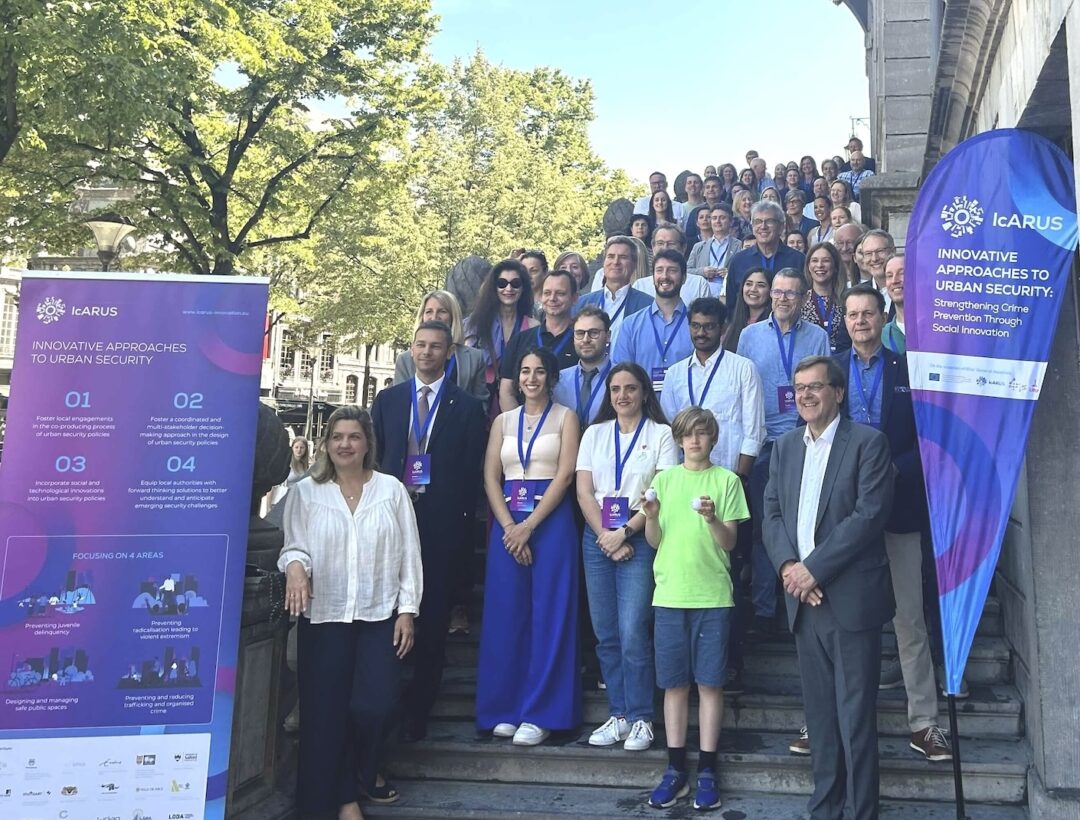Madrid, Spain, 25-27 September 2019 – The Horizon 2020 PRACTICIES project (Partnership against violent radicalisation in cities) brought together 80 experts from across Europe for a two-day conference on local strategies to prevent violent extremism (PVE), on 25-27 September in Madrid (Spain).
Representatives from the project consortium, its working group of cities, as well as other practitioners and policy makers from municipal, national and supranational policy levels from Europe, North Africa and North America gathered at the Spanish Ministry of the Interior’s Technological Centre for Security (Centro Tecnológico de Seguridad, CETSE). The diversity of its constituency being one of the project’s main assets, the event brought together teachers, social workers, police officers, elected officials, psychologists, political scientists, anthropologists, communication specialists, software engineers and diplomats who engaged in intense exchanges and discussions.
> Presentation of practical tools to reinforce local prevention strategies
The prevention tools developed since the inception of PRACTICIES are among its key deliverables. They include:
- A software application that automatically scans websites and online fora for extremist content. Fed by an extensive database in English and in French, this application “crawls” online content and detects the parts that may contain extremist content. Tailored for law enforcement agencies, it aims to facilitate the work of investigators, allowing them to automatically pre-search large amounts of online content. The developer of this tool is the Galicia (Spain)-based telecommunication technology provider Gradiant.
- The digital storytelling methodology “Digital Me”. Digital Storytelling is a creative process through which people tell a personal story in the form of a short film (two-three minutes), using still images and a voice over. This methodology aims to enhance social inclusion and active citizenship and responds to crucial training needs detected among young people, such as intercultural and cross-cultural skills, critical thinking, collaborative and project-based learning, creativity and digital literacy. This tool, developed by the Brussels-based NGO MAKS VZW, is addressed to teachers and social workers across Europe. A teacher toolkit is available online, and train-the-trainer seminars will be conducted soon.
- A serious game intended to develop young people’s critical thinking skills about the information they encounter from any available source, legitimate or not (news, social media, online fora, blogs…). Players play the role of a journalist working in a newsroom. They have to publish more or less rigorous information depending on their newsroom’s editorial line (there are several available) and meet daily objectives. Players are given a score at the end of the day on the rigour of the news they published.
> Discussion on recommendations to local, national and supranational governments
Three workshops were held on policy recommendations to be addressed to local, national and supra-national levels of government. Upon request from the European Commission, the project consortium will build on the experience gathered during the project to design concrete suggestions and guidance on how to step up prevention efforts in Europe.
During the workshop sessions, all the project’s ‘work packages’ presented draft recommendations, which were discussed with external experts.
As chair of the workshop on the local policy level, Efus moderated a debate between the project partners, members of the working group of cities, and other participants, including elected officials, police officers, prevention practitioners and researchers. Taking into account important previous guidelines, such as the Aarhus Declaration (2016), the Rotterdam Declaration (2016) and the Nice Declaration (2017), the group took the time to develop a specific, interdisciplinary approach as established by the PRACTICIES project. The recommendations are now being revised and will be published and submitted for adoption to political decision making bodies in the months to come.
> Project enters final phase
The PRACTICIES project (May 2017 – April 2020) now enters its final phase, which will focus on the dissemination of and capitalisation on its results.
The prevention tools, now available in beta versions, will be tested by municipal prevention practitioners. A final meeting and study visit of the working group of cities coordinated by Efus will take place on 7 and 8 November in Toulouse (France). A dissemination seminar, targeting partners in the Euro-Mediterranean region, will take place on 12 and 13 December in Rabat (Morocco).
Lastly, PRACTICIES’ final conference will be organised by Efus in conjunction with its General Assembly, in March 2020 in Riga (Latvia). For further information on PRACTICIES see www.practicies.org and www.efus.eu.



